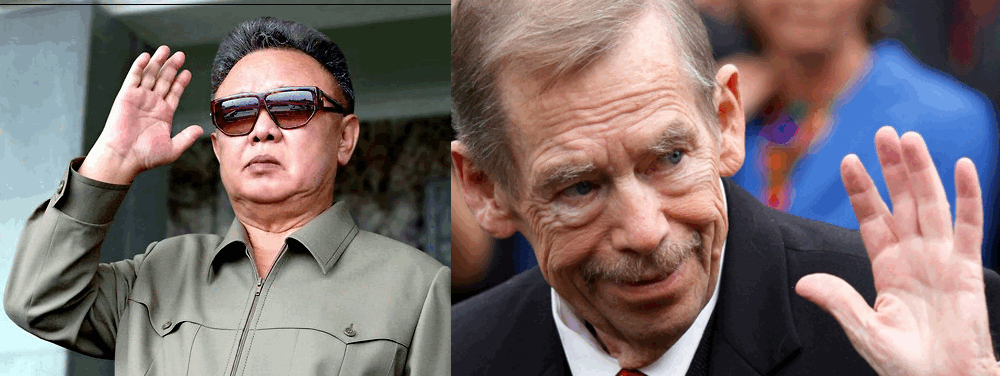It’s easy to find the comparative “vs” style of debate reductive. Star Wars vs Star Trek. Deep Impact vs Armageddon. Hanukkah vs Christmas. The combative juxtaposition of things that have little more than a common word or date or cosmetic similarity can seem like a glib form of pointless measurement, but, if you do it properly, it can help identify the successes and failures in a way that solitary analysis may not.
So, the last couple of days, I’ve been comparing Kim Jong Il and Vaclav Havel, simply because they happen to die within about twenty-four hours of one another. A few extra days’ grace between the events, and nobody would ever have even considered mentioning these two in the same breath.
And yet they couldn’t be more similar in terms of having absolutely nothing in common. It’s almost like we’ve been living in some sort of elaborate HBO series called “Leaders”, in which the lives of two heads of state are shown in tandem, until the last episode of the final season when, dripping with subtextual meaning, THEY DIE ON THE SAME DAY. Then we are left to ponder: who is the real world leader? (That question doesn’t make any sense, but it’s the sort of thing that would look great on a pitch document.)
Vaclav Havel was born in Prague just before World War Two, and grew up in a country occupied by Germany. Kim Jong Il was born in Korea during World War Two, and grew up in a country occupied by Japan.
Havel was a highly successful playwright, whose works were banned due to his opposition of the communist state and its oppression. Kim Jong Il liked movies, despite banning most of them in his country, and would kidnap filmmakers from South Korea to make them for him.
Despite his desire to stay away from political office, Havel was elected as President of the newly-formed Czech Republic after its split with Slovakia. With a brazen desire for power, Kim Jong Il was appointed President of North Korea, itself split from South Korea.
Havel, who was extremely popular amongst his people, was elected for a second term, and choose to leave at its conclusion. Kim Jong Il’s state-enforced popularity in a country without elections saw him cling to power until the moment of his death.
Vaclav Havel was the subject of the extraordinary three hour documentary Citizen Havel, which traced his Presidency from its first days through to its last, spanning the ten years he was in office. Kim Jong Il was the subject of the marionette puppet action film Team America, in which he was portrayed as a bumbling villain.
Vaclav Havel’s death was sedately reported by a few outlets. Kim Jong Il’s death dominated the news for days.
I suppose it shouldn’t be surprising that Kim Jong Il’s death is such a big deal. North Korea is one of the big question marks on the planet, and any disruption to that power structure given the ever-present possibility of war is going to be something we need to pay close attention to.
But at the same time, it’s a shame that we’re spending so much energy on the legacy of a man who did his best to promote and foster oppression, while spending so little on a man who spent his life successfully fighting it.
Superficial comparisons may be good for giggles, but they highlight just how much power can corrupt, and extraordinary it can be when it doesn’t.


A similar “vs” battle happened with Steve Jobs and Dennis Ritchie, who died within a week of each other. Ritchie invented the C-Programming language and help create Unix – he was largley reponsible for making the Personal Computer Revolution possible and most systems (including Apple and Microsoft) are based on his work. Jobs, however, invented the iPhone (or at least, held it up in front of a room full of people).
I’m not saying Jobs doesn’t deserve credit, or that his death wasn’t tragic, but it’s sad that someone like Ritchie got buried in the news cycle.